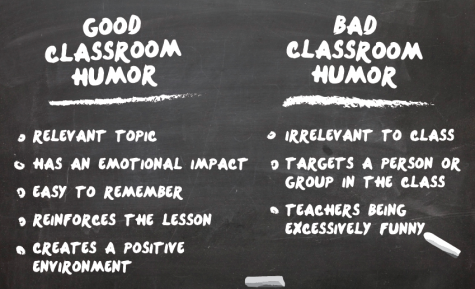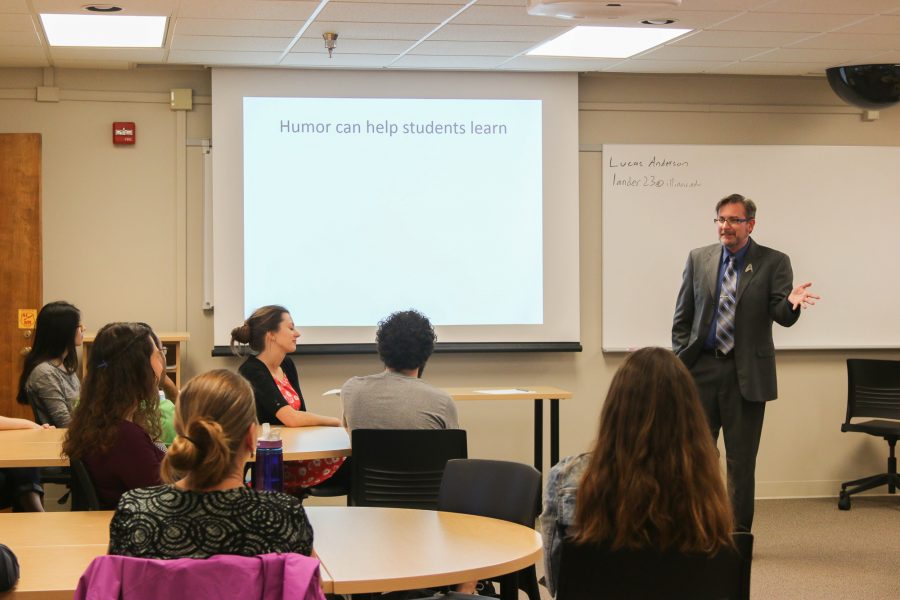Bringing humor to the classroom is no laughing matter
Lucas Anderson, a Specialist in Education and part of The Center for Innovation in Teaching and Learning, presented Make ’em laugh, a workshop on the usage of humor in classrooms on Monday, October 17th 2016.
October 19, 2016

Absurdities can be seen in just about every part of life, especially the classroom. When students are sitting in a lecture and their eyelids are starting to droop, acknowledging absurdity can sometimes make getting through that class more manageable.
Lucas Anderson, specialist in education, held a workshop Monday evening in the Armory on how teachers can incorporate humor in the classroom. In this workshop, he discussed the benefits of humor, the types of humor and inappropriate humor.
“Humor is a sign that (the professor is) a real person, who you might want to talk to and ask questions about,” Anderson said.
This is exactly what Jason William Morrissette, assistant head of the department of theatre, tries to incorporate every day in his classes.
“It can offer us some relief; it can offer us some new ways of looking at something,” Morrissette said. “If you want to experience a learning situation on every level possible, humor has to be included in some of that.”
Get The Daily Illini in your inbox!
Anderson said humor in the classroom often improves student learning. It helps students stay more engaged in the subject matter, while making the work environment more relaxed.
“If the class starts to get really long, it becomes increasingly easy for students to be thinking about other things, and humor can do something to bring attention back to the subject at hand,” Anderson said.
When a teacher includes humor in their lessons, it tends to make students less anxious in the classroom environment. Therefore, students feel more comfortable approaching the teacher and asking questions when they are confused on a certain subject matter. It also makes them more engaged in the lesson being taught.
“If a teacher incorporates humor, it makes the class more interesting, and just makes me pay attention more,” said Patricia Marek, freshman in education.
Anderson said in his workshop that the best kind of humor in the classroom is humor that is relevant to the subject matter and reinforces the lesson. It should also create a positive environment and have an emotional impact on students.
“If you can find a comic, or an image, or a joke that is actually relevant to what you’re talking about, that’s going to be the best because it adds a little emotional impact to your message,” Anderson said.
However, Anderson warned that any form of humor that is targeted at a certain person or group of people in class should be avoided.
“Most of the types of inappropriate humor fall under one category, which is humor that sacrifices one portion of your audience for the amusement of another,” Anderson said.
One of the best ways to implement positive humor in the classroom is by getting a sense of what pop culture the class is interested in, Anderson said. This allows teachers to get a grasp on what type of TV shows students are watching or what type of music they are listening to and help them steer their lesson plans to topics that will motivate the students to pay attention.
For Morrissette, humor helps him bridge the gap between student and professor.
“We look at professors as non-human entities,”Morrissette said. “Humor is a way for me to crack that open a little bit. It’s also a way for me to relate with students.”
While humor is definitely beneficial, there are other ways teachers can engage their students. If a teacher is genuine and shows that they truly care about the students and the subject matter, a lack of humor won’t affect the learning environment, Anderson said.
“My favorite personality in a teacher is definitely if they care about me as a person, not just a student,” Marek said.







